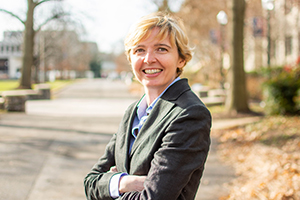Business
Bruno’s Research Pushes the Status Quo Valentina Bruno, Professor of Finance, is affecting change in the Finance world

Valentina Bruno is not one to accept the status quo. She believes in pushing things forward—especially with her research.
This is what drove Bruno, Finance Professor at the Kogod School of Business, to completely re-hash the model used to understand the banking sector. She knew it needed to be re-structured after the late 2000’s financial crisis, she says, and was ready to “explore this world.” “Scholars were making assumptions that weren’t realistic for financial institutions,” she says.
Current research did not consider the challenges banks (and corporations and individuals) face in the global economy. Scholars focused only on the specific country where a bank, person or company was located. “We needed to look at issues on a global and interconnected level,” Bruno says.
Working with her colleague Hyun Song Shin, Economic Advisor and Head of Research at the Bank for International Settlements, they began to examine what affected financial institutions globally. Bruno and Shin started investigating factors such as the exchange rate, the role of the dollar in other countries, international interest rates and liquidity.
The result? A startling discovery about the strength of the U.S. dollar…and a whole lot of media coverage.
Their study “Global Dollar Credit and Carry Trades” outlines their findings. A strong U.S. dollar (USD), while beneficial to the global economy on the surface, is actually the cause of a great deal of financial instability. Because a strong USD typically means another country’s currency is weaker, it causes an exchange rate imbalance, creating higher expenses for individuals and institutions with liabilities that are not denominated in their domestic currency. Debt repayment—mostly in US dollar currency—could go out of control, with devastating effects.
“This has important policy implications,” says Bruno. “It’s an issue of global financial stability.”
The study, published in 2017 in the Review of Financial Studies, has already received wide press coverage—most notably in The Economist’s cover story in December 2016. Bruno and Shin are both thrilled at the impact of their work.
"Key policymakers and international organizations have already started utilizing the findings from our research," Bruno says. "The study has also been frequently cited in the press and in official central bank speeches."
Bruno calls their research “provocative.” It’s work that challenges the traditional views on finance, and helps people better understand the reality of the sector. She thinks this is crucial not just for academics and practitioners, but for her students, whom Bruno sees as the “future of finance.”
“My students have told me that many of their text books have ‘Mickey Mouse’ exercises in them—situations that are ideal, but not realistic,” Bruno explains. “The finance world is complex, and we have to make sure we’re educating them on its irregularities.”
Bruno aims to do so in her Financial Markets and Institutions class. She structures the course not solely around textbooks, but around articles, business cases and research papers. This keeps students up-to-date on current events, and challenges them to apply financial theory to modern day problems. “I use theory as a way of understanding different viewpoints,” Bruno says.
Bruno plans to continue her research surrounding the U.S. Dollar, in hopes of enlightening the public to the complexities of international currency exchange. Specifically, she wants to pinpoint problems corporations have when borrowing money not from their country—such as what challenges arise when one has multiple mortgages in different parts of the world.
Most of all, she hopes to affect change—for finance practitioners an academics alike. “There is still a lot we don’t know, and that’s what I’m working on,” Bruno says. “It’s time to find answers to finance’s many unresolved issues.”